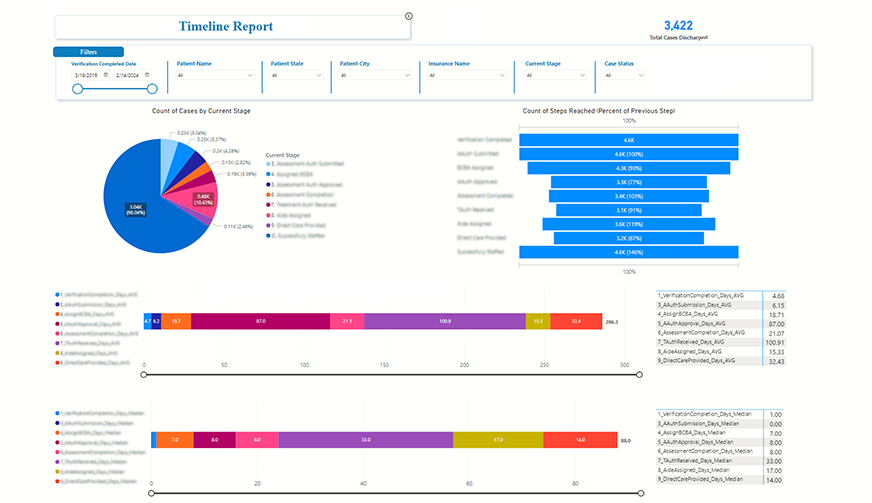Data, Analytics & AI
Data from all your sources brought together for deep insights
Data Drives Businesses
From business intelligence to artificial intelligence and robust data management platforms, Dymeng has the experience necessary to put your data to work for you. We deliver advanced analytical solutions and highly interactive dashboards and visualizations to allow you to explore the most difficult questions your business faces.
Business Intelligence (BI)
Business intelligence is built on three pillars: data management, analysis, and visualization. Dymeng’s data team works at all levels to bring you insight into your most difficult questions.
INTERACTIVE VISUALIZATIONS
The best visualization tools don’t just have fancy charts and graphs, they provide an interactive environment that starts with a clear, high-level view of your subject data and the ability to quickly drill into specific areas and identify data anomalies.
Dymeng’s BI platforms allow you to explore contextual data in varying levels of granularity, providing an excellent means of determining not only what the picture is, but why.


ADVANCED DATA ANALYSIS
Highly interactive dashboards and reports are based on and integrated with prerequisite data analysis to reach their full potential.
Whether it’s fairly simple fiscal or temporal analysis such MoM or YoY trends, deeper analytics based on layers of business rules or complex what-if scenarios, Dymeng’s data team has the experience to shape the data in ways that bring the intelligence to your BI suite.
Artificial Intelligence (AI)
Dymeng has been researching and working with AI since before ChatGPT turned it into a household term, and we know a thing or two about the playing field. Training with domain data, intellectual property concerns, and commercial service risk management are all areas we can help with. (curious? Check out or AI for Business whitepaper that takes a “real” look at AI – not just the current GenAI craze – and how to incorporate it into your organization)
CUSTOM GEN AI
One of the most common uses of custom AI solutions is with Generative AI, specifically using LLMs (Large Language Models). These are often used in text-generation or text-summarization tools.
We can help align these needs with internal models, providing pre-trained algorithms securely supplemented with your organization’s domain data.
COMMERCIAL SERVICES
Incorporating commercial AI services can be an economical way to utilize the power of GenAI. Dymeng has brought these into the fold for clients through various systems integrations, while guarding against intellectual property and domain data leakage.

BEYOND GEN AI – A TRUE LOOK AT THE FIELD
The potential for AI goes far beyond the current buzz around GenAI. Dymeng has been researching and working with AI long before ChatGPT turned it into a household name, and there’s quite a bit of potential beyond today’s common implementations.
PATTERN RECOGNITION
Pattern recognition is the ability to find known patterns or identify unknown patterns. This can apply to tabular data, visual components (image analysis), video and motion patterns and many other scenarios. Pattern detection is the base of many other types of AI.
PREDICTIVE ANALYSIS
Predictive Analysis is a type of AI that builds on top of pattern recognition and trends, using simulations and various context input parameters to predict what might happen. Like Pattern Recognition, this is not only applicable to tabular data trends, but can also be applied to visual, audio, motion and more.
NATURAL LANGUAGE PROCESSING
Natural Language Processing is a means of working with human language. It's core objective is to interpret and understand the various nuances of written or spoken text, taking into account cultural factors, context information and many other aspects to strive for "human-like understanding" of language.
GENERATIVE AI
Did you know that Generative AI is just a mix a Predictive Analysis and (in the case of GPT models), Natural Language Processing (NLP)? That AI chatbot is using NLP to attempt to understand the request, and based on its understanding, using predictive analysis to "predict" what answer might be relevant. Also applicable to motion, imagery, audio data, simulation scenarios and more.
When it comes to fully understanding and applying Artificial Intelligence to business use cases, we wrote the book. Quite literally Artificial Intelligence (AI) for Business
This whitepaper takes a high level look at the entire AI playing field. Different types of AI and its availability and adoptability. Cost implications of implementation and maintenance. Security and data concerns. Risk management, Time-to-Obsolescence, tips and tricks, legal and ethical considerations…
If you’ve ever wanted to cover the breadth of a field from a business-use standpoint to better understand how it might or might not be applied to your organization, this whitepaper is for you.
Data Management
Data is the backbone of all BI and AI. The ability to harness and manage it is essential to the success of any BI or AI endeavor.
Dymeng’s founder (Jack D. Leach) was rooted in data long before founding the company. A regular speaker at conferences around the world and recipient of several globally recognized awards for his real-world experience in the area, our company was built with core data management in its foundation, just as your BI and AI solutions should.
DATA CENTRALIZATION
Data lives everywhere, and getting it out of the many places it hides and into a centralized warehouse is a key aspect of analytical ventures.
DATA SANITIZATION
Ensuring data is clean and valid is critical to the integrity of your analytics suite. We incorporate this into automated pipelines that prepare your data for inclusion in your reports, dashboards, and AI sets
DATA CORRELATION
Having all your data in one place doesn’t do much good if it can’t play nicely together. Dymeng identifies key fields from various sources and transform it all into a highly correlated data set for your analytical needs.
DISCOVERY & PLANNING
Need a particular data point into order to solve some burning BI problem, but it doesn’t exist? Dymeng’s experience with data, software of all sorts and keen business understanding allows us to find the ideal places and workflows in which to generate and capture these critical data points.
SYNTHETIC DATA
Have a highly valuable data set, except it’s missing a swath of data through some period of time? Dymeng can create synthetic data from trend analysis, backfilling your history with reasonable accurate assumptions that provide the ability to further analyze.
Understanding our day-to-day operations
“After many unsuccessful ventures with other companies that were unable to deliver what they promised, we partnered with Dymeng to design a new program for our data management. From the start, Jack was fully immersed in creating a custom database program. He and his team of developers are able to communicate in non-technical language in order for our employees to understand the automation process and able to listen to our organizations needs and priorities.
Jack’s thorough assessment, analysis, and understanding of our day-to-day operations in combination with his experience, technical skills, and integrity was able to develop a personalized custom program to suit our growing business needs, within our budgetary restrictions. We are extremely pleased with our experience with Dymeng and will look to them for all our future needs.”

Laura Weidner
Director of Operations